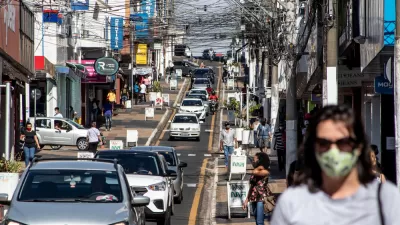Cities around the world have continued to implement drastic measures in reaction to a proliferation of billboards.
Arwah Mahdawi examines the spreading influence of the city of São Paulo's 2007 Clean City Law:
"In the last decade, from Bristol to Tehran, there been a global movement to un-brand cities – to rid them, at least partially, of adverts. Citizen vigilantes, artists and activists are playing important roles. Etienne Lavie, for example, has re-imagined what cities would look like if classical paintings replaced adverts; a team of developers in New York has created No Ad, an augmented-reality app that strips the New York City subway of ads, replacing them with art; and in 2008 a group of Bristol citizens petitioned (albeit unsuccessfully) to ban advertising from the city."
The work of those citizen vigilantes, according to Mahdawi, has also produced policy change from municipalities:
"In 2009, Chennai, India banned the erection of billboards, and several US states including Vermont, Maine, Hawaii, and Alaska are billboard-free. In 2011, Paris set out plans to reduce the number of ad hoardings by a third. And earlier this year, Tehran replaced all its 1,500 advertising billboards with art for 10 days."
The article goes on to examine a few surprising arguments for keeping billboards, the case made by the aforementioned vigilantes, and the consequences of the decision to remove 15,000 billboards and 300,000 over-sized storefront signs from São Paulo.
FULL STORY: Can cities kick ads? Inside the global movement to ban urban billboards

Planetizen Federal Action Tracker
A weekly monitor of how Trump’s orders and actions are impacting planners and planning in America.

Maui's Vacation Rental Debate Turns Ugly
Verbal attacks, misinformation campaigns and fistfights plague a high-stakes debate to convert thousands of vacation rentals into long-term housing.

Restaurant Patios Were a Pandemic Win — Why Were They so Hard to Keep?
Social distancing requirements and changes in travel patterns prompted cities to pilot new uses for street and sidewalk space. Then it got complicated.

In California Battle of Housing vs. Environment, Housing Just Won
A new state law significantly limits the power of CEQA, an environmental review law that served as a powerful tool for blocking new development.

Boulder Eliminates Parking Minimums Citywide
Officials estimate the cost of building a single underground parking space at up to $100,000.

Orange County, Florida Adopts Largest US “Sprawl Repair” Code
The ‘Orange Code’ seeks to rectify decades of sprawl-inducing, car-oriented development.
Urban Design for Planners 1: Software Tools
This six-course series explores essential urban design concepts using open source software and equips planners with the tools they need to participate fully in the urban design process.
Planning for Universal Design
Learn the tools for implementing Universal Design in planning regulations.
Heyer Gruel & Associates PA
JM Goldson LLC
Custer County Colorado
City of Camden Redevelopment Agency
City of Astoria
Transportation Research & Education Center (TREC) at Portland State University
Jefferson Parish Government
Camden Redevelopment Agency
City of Claremont




























